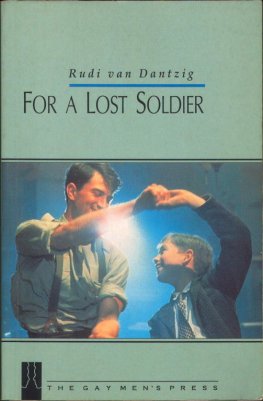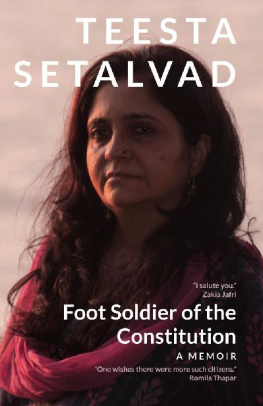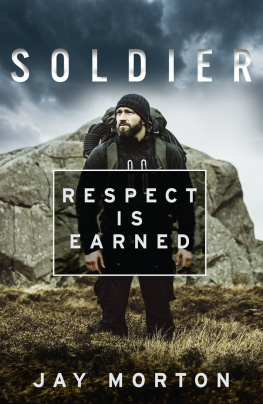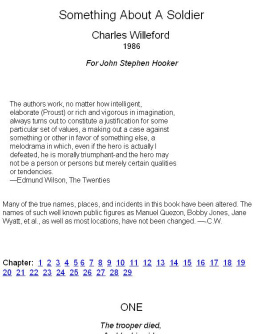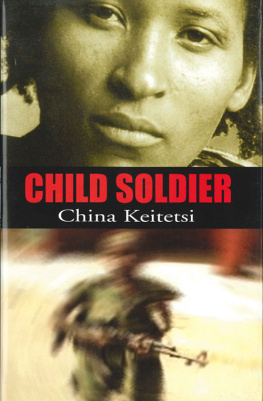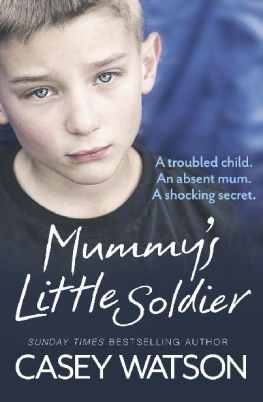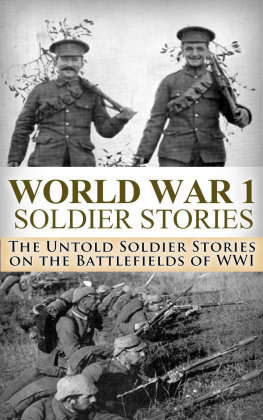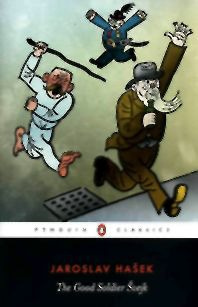Abdullah Barka - Gaddafis Child Soldier
Here you can read online Abdullah Barka - Gaddafis Child Soldier full text of the book (entire story) in english for free. Download pdf and epub, get meaning, cover and reviews about this ebook. year: 2013, publisher: Abdullah Barka, genre: Non-fiction. Description of the work, (preface) as well as reviews are available. Best literature library LitArk.com created for fans of good reading and offers a wide selection of genres:
Romance novel
Science fiction
Adventure
Detective
Science
History
Home and family
Prose
Art
Politics
Computer
Non-fiction
Religion
Business
Children
Humor
Choose a favorite category and find really read worthwhile books. Enjoy immersion in the world of imagination, feel the emotions of the characters or learn something new for yourself, make an fascinating discovery.

- Book:Gaddafis Child Soldier
- Author:
- Publisher:Abdullah Barka
- Genre:
- Year:2013
- Rating:4 / 5
- Favourites:Add to favourites
- Your mark:
- 80
- 1
- 2
- 3
- 4
- 5
Gaddafis Child Soldier: summary, description and annotation
We offer to read an annotation, description, summary or preface (depends on what the author of the book "Gaddafis Child Soldier" wrote himself). If you haven't found the necessary information about the book — write in the comments, we will try to find it.
Gaddafis Child Soldier — read online for free the complete book (whole text) full work
Below is the text of the book, divided by pages. System saving the place of the last page read, allows you to conveniently read the book "Gaddafis Child Soldier" online for free, without having to search again every time where you left off. Put a bookmark, and you can go to the page where you finished reading at any time.
Font size:
Interval:
Bookmark:
Gadhafi's Child Soldier
By
Abdullah Barka
2013
This book is dedicated to my beloved family
Preface
I was used as a child soldier by the Gadhafi regime in the war with Chad between 1987 and 1988.I was a victim of the brutal, dictatorial regime of Gadhafi who was using Libyan people for his adventures and power politics. I was captured by Chadian Forces in the Wadi Doum battle and escaped captivity after 12 months. When I arrived in Libya I was put in solitary confinement in Abu Saleem Prison accused of spying.
During the 1970's the Gadhafi regime received huge inflows of cash from the oil exports. This wealth was misused. Gaddafi cancelled the Libyan constitution and banned political parties. He constructed a vague system based on ideas of his Green Book. His main point was that 'people should rule themselves'. He spent a lot of time and money convincing Libyan people and the world that the Green Book offered salvation to the world from Communist and Capitalist approaches. However, eventually he himself abandoned his own doctrine.
During the late 70's he imported a lot of weapons from many countries especially the Soviet Union. He ordered all the Libyan people including secondary school students to learn how to use weapons under a motto of 'armed people' in his deluded Green Book. We understood at that time only one of his goals which was to interfere in southern African countries like Chad and Niger. He also started supporting terrorist groups around the world. His second goal, which we understood only after Libyan Revolution, was to distribute weapons among the Libyan tribes so that they would fight each other and thereby prove his regime, was the only solution alternative for civil society in Libya.
We were at secondary school in Murzuk city south Libya when a captain marched in and ordered us to follow him to the military base where buses were already waiting for us. We were taken to Sabha airport and each given Kalashnikov. We found ourselves in a Libyan Army base called Wadi Doum in northern Chad. In The following pages of this book the reader will see the true story of my tragedy which started at school and ended in Abu Saleem Prison.
I would like the Libyan people and other third world countries , especially in Africa to learn from my tragedy. They should build democratic systems, based on the rule of law and human rights, and the principles of freedom and equality. All citizens should be equal regardless of their beliefs, race or colour. They should shun autocracy and embrace constitutional democracy.
Contents:
Chapter 1:
From school to the battle field
Chapter 2:
Wadi Doum base
Chapter 3:
Wadi Doum battle
Chapter 4:
Prison escape
Chapter 5:
Tibesti
Chapter 6:
Escape to Libya
Chapter 1
From school to the battle field
I would like to bear witness to the brutal rule of Gaddafi and his family, who ruled Libya with an iron fist for more than 42 years. This testimony represents a drop in ocean of Gaddafi crimes and it illustrates just a few lines from Black Book of Gaddafi's rule. However, my testimony will be useful for those who want to learn something about Libyan history, especially the exploitation of children in the war against Chad. This story will also encourage young students and ambitious people to overcome the obstacles in their way and help them achieve their goals as I have done, after all I overcame my captivity and finished my studies. The Gaddafi regime's invasion of Chad was one of Gaddafi's most painful blows against the Libyan people, who paid a heavy price both in lives and money.
I was not able to speak out about my tragedy during Gaddafi era because the intelligence agencies would have put me back in Abu Salim prison. I have been waiting for this moment for long time, a moment of freedom to express my ideas. After the Libyan revolution of seventeenth February 2011 I can now write my story and make it available for our children and grandchildren, so that they can learn how a military dictatorship can damage their citizens, human development and countries. Forty-two years of dictatorship have ruined Libyan society and encouraged bad behaviour among its citizens such as bribery, corruption and a bureaucracy which is so complicated that only the corrupt can function in and indeed exploit it. Corruption has become so widespread in Libya that you can't imagine the system working without it. This is a great challenge to the new leadership.
I am a victim , a child soldier, who was forced to join the military to fight in a war that I never believed in. I was captured at the battle of Wadi Doum and held for more than twelve months before I was able to escape to my country, where I enjoyed comparative 'freedom', but unfortunately I found myself in solitary in Abu Salim prison. I went through many villages and valleys in northern Chad and spent a lot of time with the Tobou tribe, who live a hard life in remotest, most isolated and barren place in the world, Tibesti Mountains, where you need endless patience to keep the wheels of life turning.
At that time there was no satellite communication in that part of the world, so my family had no information as to my whereabouts for 16 months. I can't describe my family's feelings knowing that their son had been abducted by the government and sent to fight in some unfamiliar land. It was a very painful experience both for me and my family. On the following pages I will describe what I went through on my enforced journey to Chad.
The 26 December 1986 was just another normal day in southern Libya. However, it later proved to be the turning point of many students' lives. My mother woke me early as usual. I said my dawn prayers hoping to receive God's blessing for the day ahead and had breakfast, which usually consisted of homemade pancakes and goat's milk as my parents were Bedouins. We lived in the old quarter of Murzuk where most the habitants were and still poor. The morning was beautiful. The sky was blue and it was cold and dry like any winter's day in the Sahara. It was a very enjoyable morning. I loved walking through the narrow streets of our quarter listening to cocks crowing and goat bleating hungrily for their fodder. I was full of energy and confidence and was sure I would have a better future as I always had excellent marks and was either first or second in the class. My ambition was to attend an engineering faculty and eventually raise my family out of poverty, I was sure that only a good education would help me to improve my standard of living. The Gaddafi regime was very extreme and did not support other ethnic groups in Libya. He supported the Libyan Arabs and discriminated against the minorities. The government did not care about the Tobou tribe.
My family was a small family consisting of two brothers and two sisters; absence of any individual leaves a void in the family, especially for my mother and my brother Hassan. They missed me in every moment, when eating meals and in the early morning when they wake up and did not find me in any corner of the house and had no idea anything about my fate .
My father was a policeman and he earned the respect of everybody he knew him and was a man of pure conscience worthy admiration.
We did not have great wealth and we were not suffering from financial crises, we have been middle class family in Libya .
My mother was a housewife looking after the house and goats in the barn. She descended from a dignified family and was proud of her noble family. She would tell us stories, anecdotes and old proverbs to plant morality, honesty, and courage in our minds.
I always got to school on time. Generally speaking, we would do some morning exercises and then sing national anthem before going to class. We had a military training once a week as one of the Green Book's principles was to "arm the people", I remember that on this particular day (26/12/1986) we did not have military training so we just went to the class. After sometime an army captain called Arahil stepped in to the classroom and asked us to go out into school yard and stand in line. In less than 15 minutes we were standing in formation. Then we were ordered to go to the local army base where many buses were already waiting for us. We left for an unknown destination, fully expecting to return to school following day.
Next pageFont size:
Interval:
Bookmark:
Similar books «Gaddafis Child Soldier»
Look at similar books to Gaddafis Child Soldier. We have selected literature similar in name and meaning in the hope of providing readers with more options to find new, interesting, not yet read works.
Discussion, reviews of the book Gaddafis Child Soldier and just readers' own opinions. Leave your comments, write what you think about the work, its meaning or the main characters. Specify what exactly you liked and what you didn't like, and why you think so.

